Electric furnace vs. Oil furnace- Which one are you going to choose?
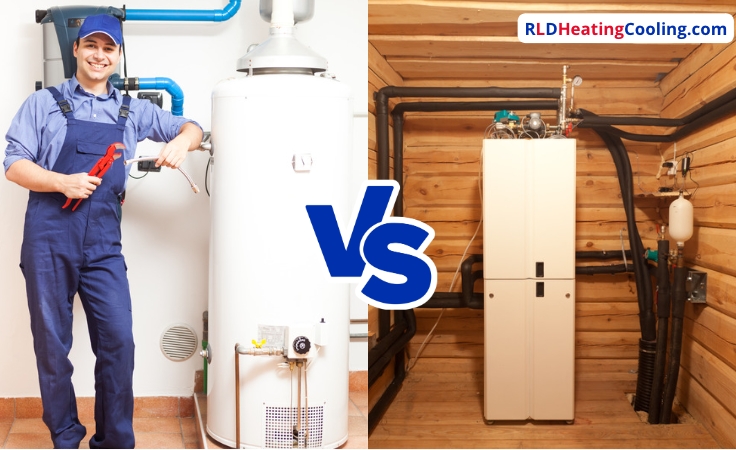
As we have already discussed gas vs. oil furnaces in our previous blog, let’s compare this one now!
It is one of the popular topics of discussion when choosing a heating system for your house.
Many think oil is a primitive option, and it’s time to switch the new and upgraded heating options.
Who wants to move for something other than more efficient, safe and cost-friendly systems?
But is it worth switching from oil furnaces to electric systems?
Well, that’s what we will find out in this blog.
Here, we will discuss the critical factors you should consider before searching for ‘furnace installation near me’ and investing in a new heating appliance.

call 818-210-6669
Contact us 24/7 for your HVAC needs
Additionally, we would examine the pros and cons of oil furnaces and electric appliances.
So, without a wait, let’s start with the blog!
Factors to consider
The simplest way to judge the heating systems is to look at how they compare alongside certain crucial factors like the following:
Electric Furnace vs. Oil Furnace Factor #1: Efficiency
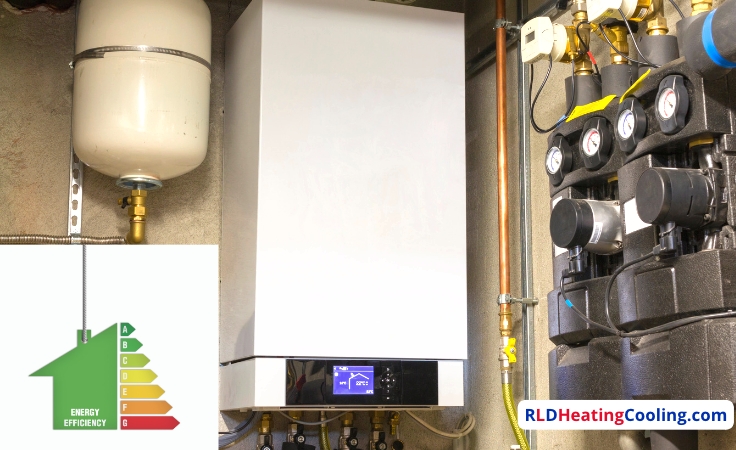
In an electric heat system, all the energy is used to heat your house, so it is 100% efficient. On the contrary, in the case of natural gas or oil furnaces, the fuel used accounts for only 95% efficiency, and the remaining 5% is lost.
However, heating oil produces more heat energy per BTU than electricity or any other fuel because it burns hotter and can heat your house quickly with less fuel.
Electric heaters are available for either whole houses or individual rooms, making them helpful in heating additional spaces or seldom-used rooms. On the other hand, oil systems have zoning options, so you can regulate the different temperatures in different spaces of your house that are not being used.
In terms of efficiency, oil furnaces surpass electric heaters, as the air delivered through them is significantly hotter.
Also check out: Furnace vs HVAC.
Electric Furnace vs. Oil Furnace factor #2: Environmental impact
Electric appliances have low emissions compared to other furnaces that operate on natural gas.

However, some argue that electricity is produced by burning natural gas, which is primarily composed of methane (95%).
While heating oil doesn’t produce emissions, we can conclude that heating oil is the cleanest fuel with zero environmental impact.
Electric Furnace vs. Oil Furnace Factor #3: Safety
Electric furnaces are safe because they do not emit harmful gas and maintain your home’s air quality.

Since there is no combustion or ignition, there is no risk of producing or leaking dangerous gases.
However, according to a National Fire Protection Association study, electric heating has caused more fires and property damage than oil furnaces tend to cause.
The main reason is that heating oil is not flammable in its liquid state.
Heating oil ignites when it reaches 140 degrees and starts to vaporize. Due to its higher flame level, it is difficult to cause ignition.
Overall, oil is both safe and more effective at heating your home. (1)
Electric Furnace vs. Oil Furnace Factor #4: Cost
Whether you choose an oil or electric furnace, the cost of the new equipment will depend on the size of your house, the type of equipment, and whether you opt for a high-efficiency system.
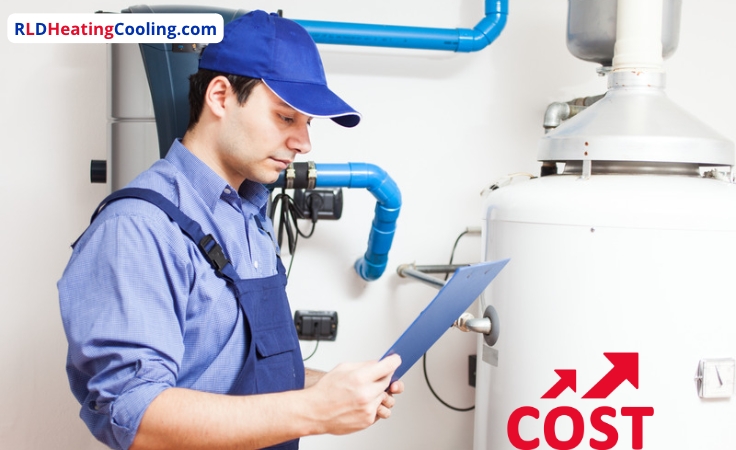
Electric furnaces often lead to high energy bills as they operate on electricity. So, if you’re on a budget, the electric furnace can be a costly option.
However, there are additional expenses involved in installing oil heaters. With oil heaters, you need to invest in a storage tank and have it installed outside your house.
Also, compare: Oil vs. gas furnaces.
Electric Furnace vs. Oil Furnace Factor #5: Lifespan
Usually, the lifespan of an electric furnace is around 20-30 years. However, it can fluctuate depending on how well you maintain the equipment.
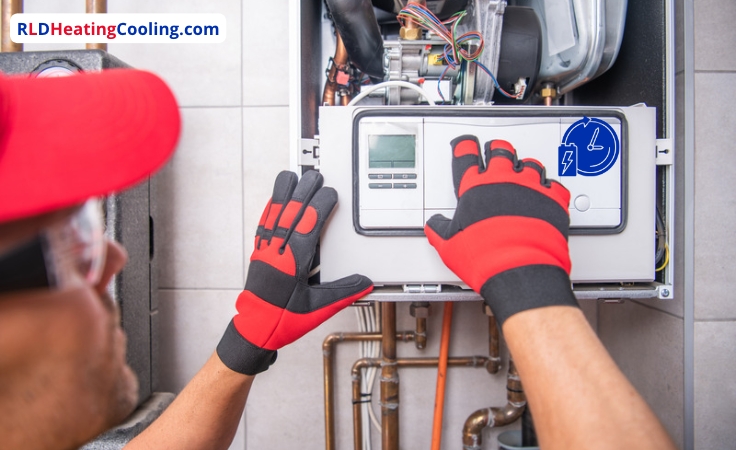
On the other hand, the lifespan of an oil furnace is around 25 years. The estimate depends on various factors, like the amount of regular and preventive maintenance. A well-maintained oil furnace has a lifespan significantly longer than one that is neglected.
Compare: Heat Pump vs. Electric Furnace.
Electric Furnace vs. Oil Furnace factor #6: Availability
Most houses have a connection to the electrical grid, so the power source for electricity is readily available.
On the other hand, oil for home heating is readily available from numerous oil suppliers worldwide.
Therefore, you must consider the heating system service and fuel availability from a practical point of view.
Pros & cons of Electric Furnace
Electric furnaces are what you think they use to generate electricity. They are inexpensive to install and maintain. For many homeowners, an electric furnace is an excellent choice as it offers several benefits:
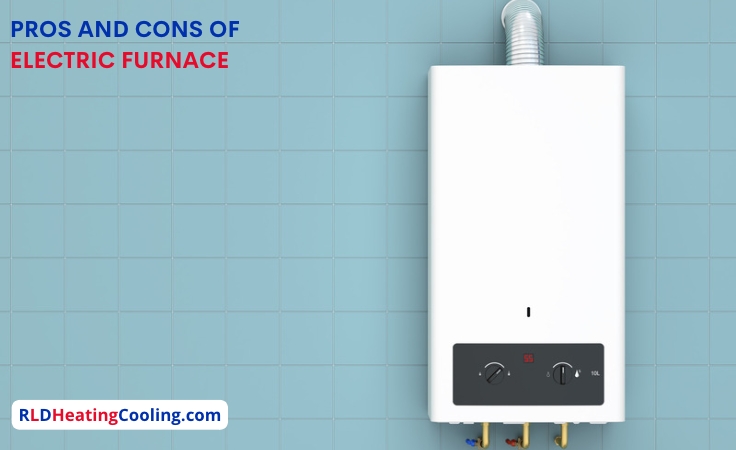
- It is readily available.
- Significant reduction in carbon and air pollution.
- With proper heating maintenance, the furnace can last up to 30 years.
However, there are several cons to having an electric furnace:
- Higher electricity bills.
- The electric furnace isn’t a great choice if you need to quickly heat your home.
- Electric furnaces cannot transfer heat to other areas.
Pros & cons of heating Oil Furnace
The advantages of oil furnaces are:
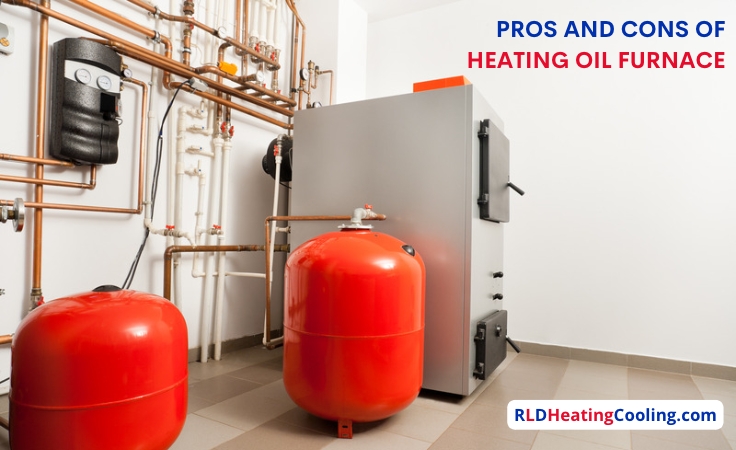
- Oil is a safe fuel and is not flammable as it does not produce any harmful gases.
- Heating oil burns at higher temperatures, producing more heat than electric furnaces.
- You can store heating oil in a tank, so you don’t have to worry about a constant supply, as you can purchase it in bulk. So you can even use it in remote locations.
Some cons of oil furnaces are:
- Involves long-term cost.
- Requires regular tank refueling to prevent running out of oil.
- Requires regular maintenance and furnace repair services to run efficiently.
Furnace-related services at RLD services
So, until now, you should have a clear understanding of which system you want for your house. Both heating systems have advantages and disadvantages, and you should choose wisely.
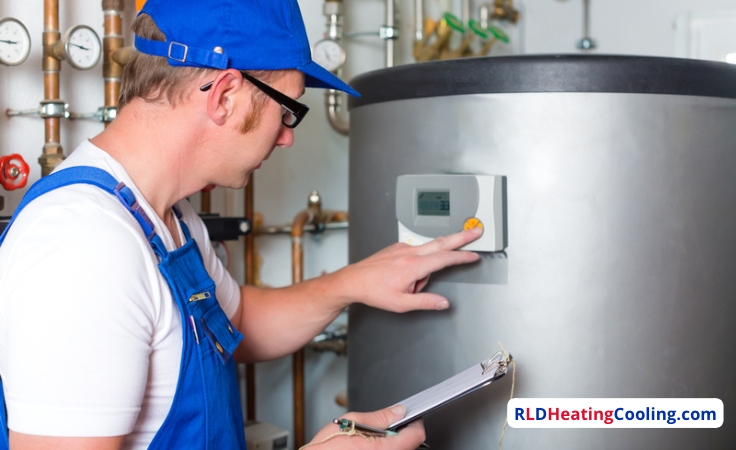
However, if you still need clarification on the right fit for your house, we at RLD Services are here to help. At RLD, we are a team of licensed HVAC contractors Los Angeles and provide different heating and cooling services like furnace and AC installation, repair, replacement & maintenance services. Additionally, we offer a comprehensive range of HVAC services. Contact us today to book an appointment.
FAQs
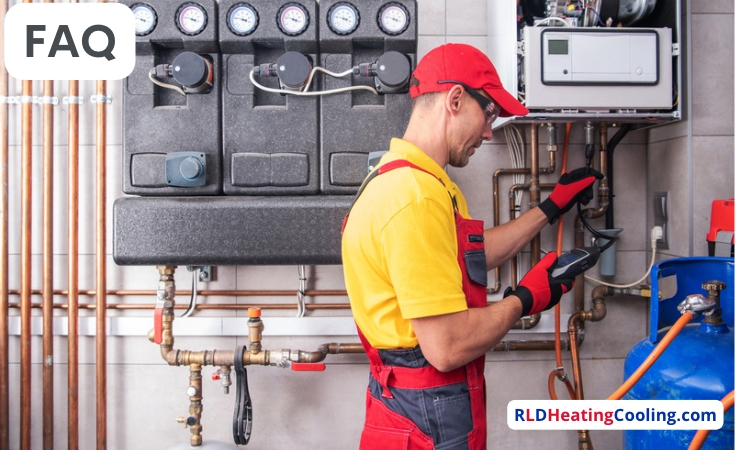
Here are some of the questions people usually ask:
Should I switch from oil to electric?
You should consider switching from oil heating systems to electric furnaces because they are safer for you and your loved ones, as they rely on natural and renewable energy sources. The system operates on electricity, not oil or gas, to get you the desired temperature or atmosphere.
Also read: Heat Pump vs. Oil Furnace.
What are the three advantages of an electric furnace?
The significant advantages of an electric furnace are:
- Enhanced safety: Electric furnaces are generally safer than oil or gas furnaces, as they operate on electricity. Therefore, there is no risk of leakage or exposure to carbon monoxide. Additionally, electric furnaces do not use fire to heat your house, eliminating the risk of fire.
- Efficiency: An electric furnace is more efficient than gas or oil furnaces if it is maintained well and regularly.
- Affordability: Electric heat costs less than gas models. They can also be beneficial because furnace installation is a considerable investment, so you can save a lot with it.
- Longer Lifespan: Electric heating systems typically last around 20 years, compared to gas systems, which last only 10-15 years.
- Readily Available Fuel Source: Electricity is readily available everywhere, so you don’t have to worry about energy availability.
Compare: Heat pump vs furnace.
What’s the cheapest way to heat a house?
The cheapest ways to heat a house are:
- Gas furnace or boiler with solar thermal panels.
- Electric combi boilers.
- Ground source heat pumps.
What is the cheapest fuel to heat a house?
Burning natural gas is one of the most affordable fuel options. The Federal Energy Information Administration (EIA) reported that the average seasonal cost of gas heating is about 70% less than that of oil heat systems.
Sources:
- https://www.energy.gov/energysaver/oil-fired-boilers-and-furnaces
